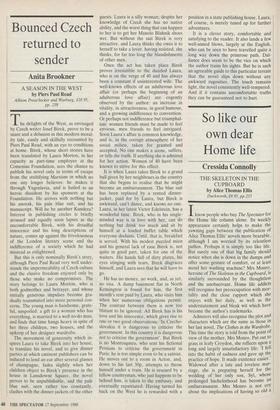Bounced Czech returned to sender
Anita Brookner
A SEASON IN THE WEST by Piers Paul Read
Allison Press/Secker and Warburg, £10.95, pp. 238
The delights of the West, as envisaged by Czech writer Josef Birek, prove to be a snare and a delusion in this modern moral- ity tale, easily and skilfully recounted by Piers Paul Read, with an eye to conditions at home. Birek, whose short stories have been translated by Laura Morton, in her capacity as part-time employee at the Comenius Foundation, sees the chance to publish his novel only in terms of escape from the stultifying Marxism in which no one any longer believes: he makes it through Yugoslavia, and is hailed as an heroic dissident by his sponsors at the Foundation. He arrives with nothing but his anorak, his pale blue suit, and his manuscript. Will he be another Kundera? Interest in publishing circles is briefly aroused and equally soon lapses as the uncomfortable Birek, with his dreadful innocence and his long descriptions of nature, comes up against the frivolousness of the London literary scene and the indifference of a society which he had misread as enlightened.
But this is only nominally Birek's story, although Piers Paul Read very well under- stands the impermeability of Czech culture and the elusive freedom enjoyed only by those who make no compromises. The story belongs to Laura Morton, who is both godmother and betrayer, and whose initially generous impulses become gra- dually transmuted into more personal con- cerns. The young man is handsome, grate- ful, unspoiled: a gift to a woman who has everything, is married to a well-to-do man, and finds that time hangs heavy in spite of her three children, two houses, and the upkeep of her designer wardrobe.
The movement of generosity which in- spires Laura to take Birek into her house, to translate his novel, and to give dinner parties at which eminent publishers can be induced to lend an ear after several glasses of champagne, fades slightly when her children object to Birek's presence in the house in Lansdowne Square, the novel proves to be unpublishable, and the pale blue suit, seen rather too constantly, clashes with the dinner-jackets of the other guests. Laura is a silly woman; despite her knowledge of Czech she has no native ability, and the worst thing that can happen to her is to get her Manolo Blahnik shoes wet. But without the suit Birek is very attractive, and Laura thinks she owes it to herself to take a lover, having resisted, she thinks, for far too long the blandishments of other men.
Once the act has taken place Birek proves irresistible to the dazzled Laura, who is on the verge of 40 and has always been a constant if uninterested wife. The well-known effects of an adulterous love affair (or perhaps the beginning of an adulterous love affair) are cogently observed by the author: an increase in vitality, in attractiveness, in good humour, and a growing indifference to convention. Or perhaps not indifference but triumphal- ism: women friends must be made to feel envious, men friends to feel intrigued. Soon Laura's affair is common knowledge, and is, in the corrupt atmosphere of her social milieu, taken for granted and accepted. No one makes a scene, suffers, or tells the truth. If anything she is admired for her action. Women of 40 have been known to strive for this effect.
It is when Laura takes Birek to a grand ball given by her neighbours in the country that she begins to realise that he might become an embarrassment. The blue suit has been replaced by a rented dinner- jacket, paid for by Laura, but Birek is awkward, can't dance, and knows no one. Laura, in her latest Victor Edelstein, has a wonderful time. Birek, who in his single- minded way is in love with her, can do nothing but drink too much and sit by himself at a loaded buffet table which everyone disdains. Until, that is, breakfast is served. With his modest puzzled mien and his general lack of ease Birek is, not quite in good part, taken for one of the waiters. His hands full of dirty plates, his eyes stinging with tears, Birek disgraces himself, and Laura sees that he will have to go.
He has no money, no work, and, as yet, no visa. A damp basement flat in North Kensington is found for him, the first month's rent paid by Laura, who visits him when her numerous obligations permit. The contrast between them is now too blatant to be ignored. All Birek has is his love and his innocence, which gives rise to one or two good observations: 'In Czecho- slovakia it is dangerous to criticise the government. In this country it is dangerous not to criticise the government'. But Birek is no Montesquieu, who sent his fictional Persians to criticise the government in Paris: he is too simple even to be a satirist. He moves out to a room in Acton, and, down to his last 50p, attempts to throw himself under a train. He is rescued by a fellow countryman, who just happens to be behind him, is taken to the embassy, and eventually repatriated. Having turned his back on the West he is rewarded with a position in a state publishing house. Laura, of course, is merely tuned up for further adventures.
It is a clever story, comfortable and satisfying to the reader. It also lands a few well-aimed blows, largely at the English, who can be seen to have travelled quite a long way down the primrose path. Dal- liance does seem to be the vice on which the author trains his sights. But he is such an agreeable guide to this particular terrain that the novel slips down without any awkward rugosities. The touch remains light, the novel consistently well-tempered. And if it contains uncomfortable truths they can be guaranteed not to hurt.


































































 Previous page
Previous page